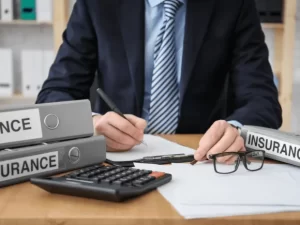What To Do If I Get Pulled Over By The Police?

If you’ve never been stopped by the police before, the thought of seeing those blue flashing lights and a police officer asking you to pull over can be pretty scary.
If it ever happens to you, don’t panic. Try to stay calm. Don’t make any rash decisions, as this could make any situation considerably worse.
Also, if the police try to pull you over, cooperate. Ignoring the police won’t make them go away, and trying to drive away will prove disastrous for you.
Remember this: Just because the police pull you over, it doesn’t mean that you’re in serious trouble. Yes, they can issue fixed penalties on the spot if you’ve committed a minor motoring offence. But in some cases they may simply let you off with a warning.
So if the police pull you over, stay calm, be polite, and be reasonable. Listen to what they say to you, don’t raise a fuss, and you’ll likely be on your way again in no time.
What to Do When The Police Ask You to Pull Over – A Step-by-Step Guide
If you’re pulled over by the police, try to take the following steps:
Look for the signs
Pull over as soon as it’s safe to do so
Stay calm
Cooperate
Compose yourself
Below, we’ve discussed each of the steps to give you more information about what to do.
Look for the signs. If a police car is flashing its blue lights, with or without the siren, while using the left-hand indicator, then they probably want you to stop. Also look out for police officers. If they want you to stop, they’ll usually make it as clear as possible, through eye contact, gestures, and shouted instructions.
Pull over as soon as it’s safe to do so. The police won’t expect you to stop where you are, so don’t slam on the brakes. Instead, look for somewhere safe to stop before calmly pulling over, while making all the usual checks. Police will usually take this into consideration before they ask you to stop, but you may have to drive for a while before you can find anywhere to pull over. In this case, try and let the police know that you’re complying, or they might assume you’re trying to escape.
Stay calm. Don’t get out of your vehicle, as the police will come to you. Roll your window down so they can talk to you. Take some deep breaths and remind yourself that the quickest way out of this is to cooperate. If it’s dark, turn your light on so that the police can see you. Keep your hands on the wheel, and don’t reach for your phone or any documents unless the police ask you to do so.
Cooperate! Be polite and respectful. If the police assert that you’ve committed an offence, and you don’t think you have, now is not the time to argue! That’s what the courts are for. Kicking up a fuss now will only make things worse. Start shouting and the police could add a few more offences to your charge sheet. Don’t worry if you don’t have your driving licence any other documents on you. If the police ask to see them and you can’t produce them, you’ll simply have to present them to a police station in the next seven days.
Compose yourself. As we’ll explore below, there are a few things that could happen when you’re pulled over by the police. But unless you’ve committed a serious offence, the police will let you drive away once they’re through talking with you. At this point there’s no rush. You’ll probably be feeling a little shaken, so take some time to compose yourself before you start driving again.
What Happens When You Get Pulled Over By The Police?
If you’re pulled over my the police, some of the following might happen:
Let off with a warning. It’s no guarantee, but sometimes the police seem to think that processing the paperwork for certain motoring offences is more trouble than its worth. So if the police have pulled you over for a minor offence, they might – might – just let you off with a warning. They’re less likely to do this if you’re rude, confrontational or uncooperative, which is why it’s a good idea to be as polite and helpful as possible.
Vehicle Defect Rectification Notice. If the police notice a particularly pressing fault with your vehicle, they might give you a vehicle defect rectification notice. If you get one of these, you’ll have 14 days to present the police with proof that you’ve fixed the problem – such as a receipt from a garage.
Fixed Penalty Notice. The police can give you a fixed penalty notice on the spot if they pull you over for certain minor motoring offences. These include careless driving, not wearing a seatbelt, and using a mobile while driving. A fixed penalty notice usually involves a fine of up to £200 and a number of points on your licence.
Breathalyser test. If the police suspect that you’re driving under the influence of drink or drugs, they can ask you to take a drug test or a breathalyser test. Refuse this without good reason and the police will probably arrest you. So again, it’s vital that you comply. Breathalyser tests give instant results. If the police find that you’re not over the limit, you’ll be free to go. But if they find you’re over the limit, they’ll take you to the nearest police station, leaving your car behind. There they’ll test you again, and if you fail this second test, they’ll arrest you and charge you.
Vehicle seizure. Police have the power to seize vehicles that are “being used in a way that causes alarm, harassment or distress”. If the police seize your vehicle, on top of any fines you need to pay for your driving offence, you’ll also have to pay a release fee for your car. This can be up to £200, and it can grow the longer you leave it.
What If I’m Pulled Over By an Unmarked Vehicle?
Sometimes police drive unmarked cars, and when doing so they still have the power to pull you over. However, the law states that only police officers wearing full uniforms can carry out stops.
Not sure if the unmarked car that’s pulled you over is a real police car? It’s best to be safe, and the police will understand your nerves and hesitancy. So don’t worry about any “resisting arrest” charges, and instead take a few steps to safeguard yourself.
First, drive to the nearest police station or, failing that, the nearest public area – such as a petrol station. Once you’ve safely pulled over, lock your doors and wait for the police officer to approach you.
If they’re wearing a uniform they’re probably genuine. But you can ask to see their warrant card if you’re still not sure.
If they’re not wearing a uniform, then even if they’re a genuine police officer, they’re breaking the law. So stay inside your vehicle and call the police.
How to Avoid Getting Pulled Over by the Police
There are a few things you can do to make it less likely that the police will ever pull you over:
Don’t break the law. Obviously! If you commit to being a safe and sensible driver, then the police will never have cause to pull you over. So pay attention to speed limits, and keep an eye on your speed. Always wear your seatbelt, and never use your mobile while driving. And of course, never drink and drive. If you’re going out and you expect to have a drink – even if it’s only one – then leave your car at home and try and find another way to travel.
Keep your car in good condition. The police can pull you over if they spot any faults with your car. So commit to regular car servicing and you’ll be able to address any issues long before they become problems. Keep your car clean too: The police may also pull you over if your car’s too dirty, as they might worry that your view will be obstructed by a mucky windscreen.
Stay on top of things. The police can access your entire motoring history by simply looking up your car registration plate on their database. If your car tax has run out, or you’re due an MOT, or even if you haven’t got car insurance, they’ll know. So keep on top of all your legal requirements as a driver – your tax, your MOT, and your car insurance – or you’ll be in very serious trouble should the police ever pull you over.






